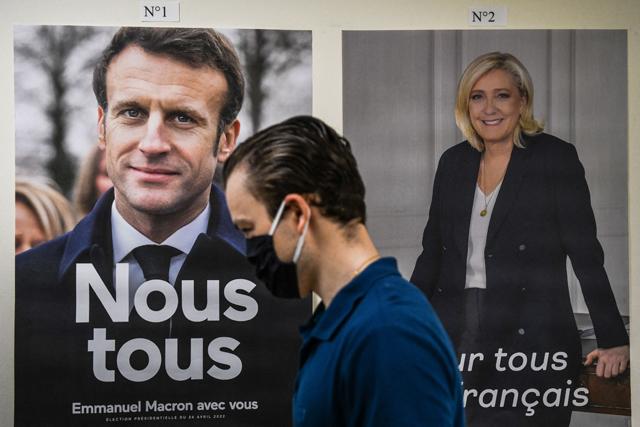You are here
France braces for Le Pen-Macron showdown
By AFP - Apr 23,2022 - Last updated at Apr 23,2022

A voter arrives to vote during the second round of the French elections at the French Consulate in Miami, Florida, on Saturday (AFP photo)
PARIS — France on Saturday prepared to choose between centrist President Emmanuel Macron and far-right challenger Marine Le Pen to rule the country for the next five years after a bitterly contested and polarising election campaign.
Macron is the favourite to win reelection in the run-off ballot on Sunday, and there are indications he bolstered his advantage with a combative performance in the one-off election debate against a somewhat defensive Le Pen.
But the president and his allies have insisted over the last week that nothing is in the bag, with a strong turnout crucial to avoid a shock in France comparable to the 2016 polls that led to Brexit in Britain and Donald Trump's election in the United States.
A Le Pen victory would send shockwaves across Europe. Left-wing EU leaders including German Chancellor Olaf Scholz have pleaded with France to choose Macron over his rival.
The stakes are huge, Le Pen would become modern France’s first far-right leader and first female president. Macron would be the first French president to win reelection in two decades.
If elected, Macron is expected, in a symbolic gesture, to address supporters on the Champ de Mars in central Paris at the foot of the Eiffel Tower.
Saturday is marked by a campaign blackout, with no campaigning allowed and no more polls published. Some 48.7 million French are eligible to vote.
Polls in mainland France will open at 0600 GMT on Sunday and close 12 hours later, immediately followed by projections that usually predict the result with a degree of accuracy.
Final campaign flurry
But voters in French overseas territories that span the globe start voting earlier, beginning with those in North America and the Caribbean on Saturday, followed by the Pacific and then the Indian Ocean.
The first to have their say in the election were voters in the tiny island territory of Saint Pierre and Miquelon off the northern coast of Canada who began casting ballots at 1000 GMT.
Macron and Le Pen threw themselves into a final flurry of campaigning Friday, firing off attacks in interviews before last-minute walkabouts and rallies.
Le Pen insisted that opinion polls giving Macron the lead would be proved wrong and took aim at her rival’s plan to push back the retirement age to 65 from 62.
Macron for his part said Le Pen was trying to mask an authoritarian “extreme right” platform that stigmatises Muslims with a plan to outlaw headscarves in public.
But the campaign also had some lighter moments. Macron’s quizzical stares during the TV debate and a daringly unbuttoned shirt during a campaigning break that provided a glimpse of his strikingly hairy chest became instant Internet memes.
Polls have shown Macron with a lead of some 10 percentage points. The highly anticipated TV debate did not change the trend and, if anything, allowed Macron to open more of a gap.
But result is predicted to be closer than in 2017, when the same candidates faced off but Macron carried the day with 66 percent to 34 percent.
Turnout ‘real risk’
Analysts say abstention rates could reach 26 to 28 percent, with reluctant left-wingers needing to back the president for him to be sure of victory.
Spring school holidays will also be in full swing across much of the country this weekend, although the 1969 record for a second-round abstention rate of 31.1 per cent is not expected to be beaten.
Far-left leader Jean-Luc Melenchon, who scored a close third-place finish in the first-round vote on April 10, has pointedly refused to urge his millions of followers to back the president while insisting they must not cast a single vote for Le Pen.
According to Martial Foucault, director of the Cevipof political studies centre, the greater the abstention rate the more the gap will narrow between Macron and Le Pen, describing this as a “real risk” for the president.
In a final plea, Macron urged voters not to repeat the mistake of those who opposed Brexit and the election of Trump but decided to stay at home.
“They woke up the next day with a hangover,” he told BFMTV. “We are going to decide the future of the country on April 24 and not the opinion polls on April 22.”
But even before the results are in, eyes are already turning towards legislative elections which will in June follow hot on the heels of the presidential elections.
French political scientist Chloe Morin told AFP that whoever wins the presidential polls France would be “harder to govern” in the next five years.
The more radical parties are likely to only win “weak representation” in parliament and set to wage their struggle in the media and the street, she said.
Related Articles
PARIS — French President Emmanuel Macron embarked Monday on a final fortnight of campaigning against his far-right rival Marine Le Pen for a
PARIS — French leader Emmanuel Macron and far-right rival Marine Le Pen on Thursday launched a final push for votes in working class heartla
PARIS — Emmanuel Macron and Marine Le Pen traded barbs on Monday as they returned to campaigning for the French presidency ahead of a prime-












